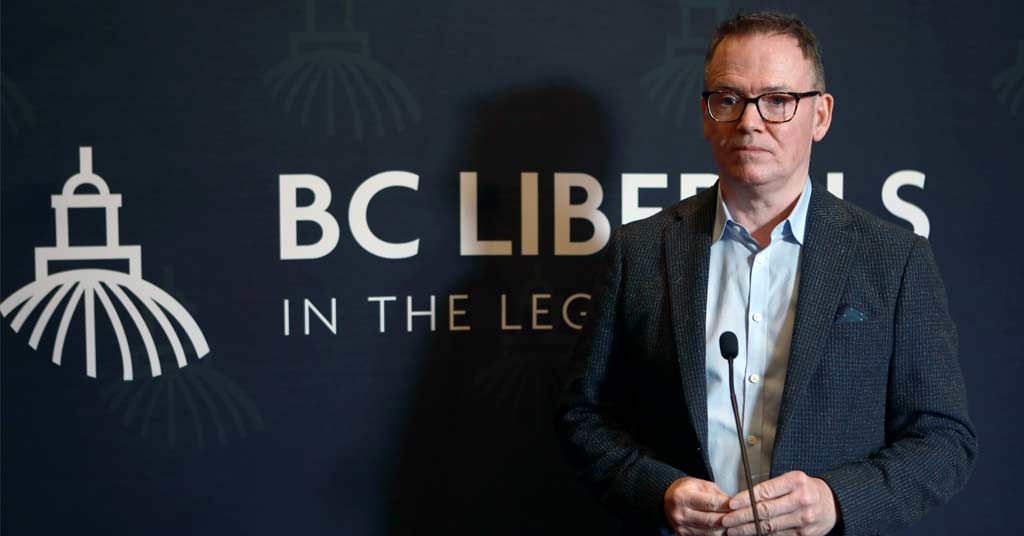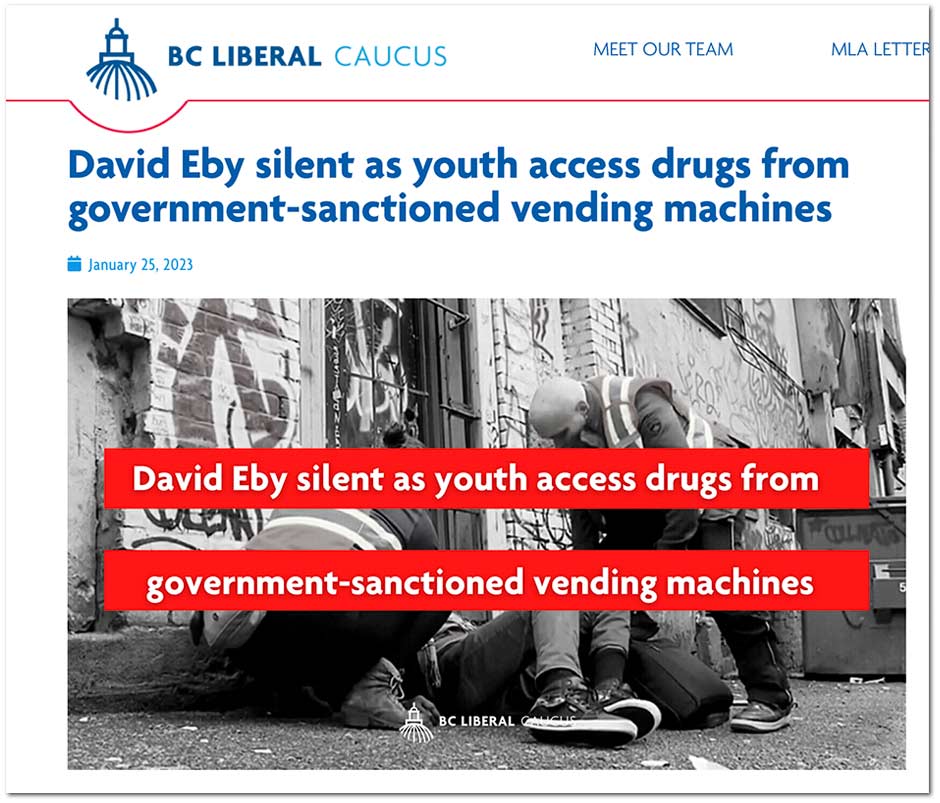
No, BC Liberals: Kids in British Columbia Can’t Buy Drugs From ‘Vending Machines’
Days ahead of decriminalization, anxieties surrounding drugs are being stoked by those who oppose safe supply
Drug policy experts say claims from British Columbia’s opposition BC Liberals that children will soon be able to access hard drugs from “vending machines” are not accurate.
In a press release this week, the BC Liberals claimed there is “increased concern” from experts that youths can buy drugs from “government-sanctioned vending machines” on the streets.

BC Liberal website
The release was based on an article and interview of a single source – a representative from Last Door Addiction Treatment Centre, a group with ties to right-wing political activists – who says youth in Vancouver are getting their hands on drugs from vending machines.
However, MySafeSociety, the organization that operates three secure dispensing storage machines in Vancouver, notes the safe supply program is only available to select participants who have been pre-screened to access prescribed drugs through a biometric scan.
MySafe currently operates three machines in Vancouver, one downtown and two in the Downtown Eastside, serving 90 people.
“Participants consent to having their prescriptions accessed through this secure dispensing storage machine, equivalent to an individualized storage locker. Selected participants will undergo a full medical and social assessment which includes current drug use patterns and their risk of overdose,” said MySafe in a statement.
“They will be assigned a lane in a machine and have their palm scanned for a biometric hand profile that will allow them access. Dilaudid tablets per day are dispensed in a regulated schedule.”
The group says the purpose of the project was to provide low-barrier safe supply to drug users as an alternative to the toxic drug supply that is claiming the lives of six British Columbians per day.
Contrary to what the BC Liberal press release states, the project is also funded by Health Canada and not by the provincial government.
MySafeSociety says they have seen “dramatic changes” in the lives of the program’s participants.
“We need to ask ourselves the bigger picture here and acknowledge why and what youth are doing to not die from the toxic drug supply. It is becoming clearer that young people need support and safer access too.”
Nicole Luongo, Systems Change Coordinator at the Canadian Drug Policy Coalition BC, says when it comes to information about safe supply, it is always important to check your source.
“The Last Door Recovery Society is an abstinence based addiction treatment that is very heavily invested in lobbying against progressive drug policies, including as part of a coalition in the United States” Luongo told PressProgress.
today at 7 pm https://t.co/Zcz2fTRSdQ
— Last Door Rehab (@Last_Door) December 21, 2022
“That being said, even if the story is accurate, safe supply is not widely available in the province.
It should be, and the NDP claims that it is but it’s not. So this idea that drugs that are safe are being diverted, I think we need to reframe how we approach that. It’s not inherently a bad thing.”
Luongo says it is also highly unlikely that drugs are being diverted to new, first time users.
“The only people using diverted safe supply are people who are already buying from the toxic illegal market,” she said.
“It’s important to reiterate over and over that if safe supply was actually available for the people who require it, diversion would be a non-issue. Since safe supply is not available, diversion is not inherently bad.”
Luongo points to the inaccessibility of safe supply for most people who use drugs, and that in its absence, people are acquiring drugs from the toxic, illegal market – including youth.
“A recurring theme with every policy when it comes to drug use, including this decriminalization pilot that’s starting, is the total exclusion of youth. Youth are not included as a demographic that is at risk of drug poisoning, even though they very much are,” said Luongo.
In the BC Liberals press release, Mental Health, Addictions and Recovery Shadow Minister Elenore Sturko called the concerns of safe supply being diverted to youth “troubling.”
“It’s incredibly troubling to learn from people working on the frontlines of this crisis that drugs accessed through government-sanctioned vending machines are being diverted for sale to youth instead on the street – this is every parent’s worst nightmare,” said Sturko.
But Luongo says that if youth are trying to access drugs in the first place, there needs to be a policy in place that acknowledges this.
“A parent’s worst nightmare is probably not their kid using safe drugs in lieu of toxic drugs, it is drug poisoning. Progressive policies do not initiate youth into drug use, they simply make it safer for youth who already use drugs to disclose drug use and to stay alive,” said Luongo.
“I would really love to see programming dedicated to facts based drug education for young people. And then expansion of decriminalization and safe supply to include young people who are already using drugs, and meaningfully engaging them in policy model development.”
Luongo adds that with decriminalization only applying to such small amounts of drugs, and safe supply not being accessible to most drug users, it is hard to say that progressive policies are being used.
“We don’t really have access to safe supply, drugs aren’t really being decriminalized, so when drug users’ demands, when the demands of activists and advocacy groups get kind of co-opted and watered down and then implemented partially, this is kind of what we’re seeing the repercussions of,” said Luongo.
“I just always want people to kind of be reminded that the progressive policies we’re advocating for have not failed. They’ve never actually been implemented.”
Our journalism is powered by readers like you.
We’re an award-winning non-profit news organization that covers topics like social and economic inequality, big business and labour, and right-wing extremism.
Help us build so we can bring to light stories that don’t get the attention they deserve from Canada’s big corporate media outlets.
Donate



